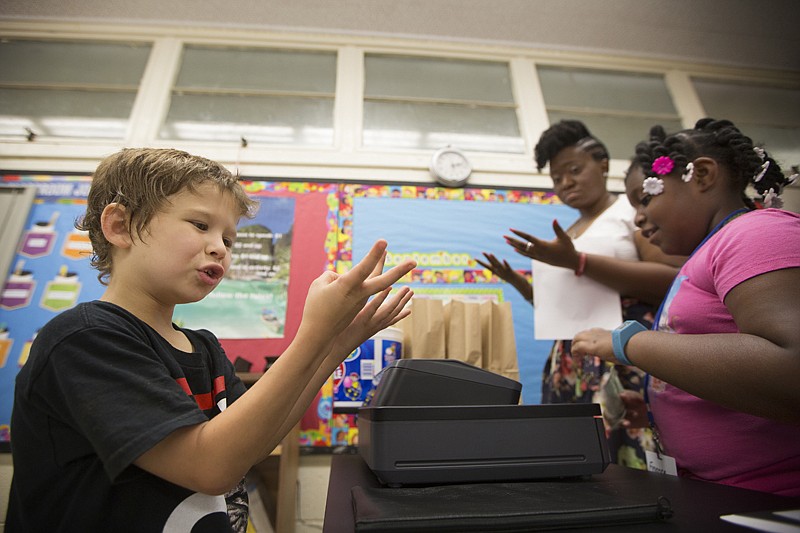Excitedly, the children wiggle in line, clutching green dollar bills in their hands, anxious to get to the cashier so they can pay their rent.
Once there, they introduce themselves, count out $5 from their bank bags, hand it to their classmate working the register, take their receipts and say thank you.
This is the scene each Friday in Juanita I. Harris' class at Union Elementary, where she is teaching her first-graders financial literacy through her Everyday Economics: Earn Money, Spend Money, Learn Economics project. She also calls it Ms. Harris' Fishing Lessons.
"The thought was if you give a man a fish, he'll eat for a day. But if you teach him to fish, he'll eat for a lifetime," she said.
Each of the children has a classroom job they are paid $5 each week to perform. They also get bonus money for certain things, including bringing back signed papers and other tasks. After students pay rent, they can shop in the class store, which contains snacks, school supplies, toys and books. Students purchase the items they want at the cash register, say thank you and return to their desks.
Harris, a Southern Arkansas University graduate who's now in her eighth year of teaching, said it teaches the children much-needed life skills. She also recently received the Bessie B. Moore Award from Economics Arkansas for implementing the program in her classroom. Harris is one of seven teachers in the state to receive the recognition, which honors teachers who go "above and beyond" what is required by developing outstanding economic and finance projects for students.
In her classroom, she says the project also shows them a path to success.
"It gives them an opportunity to practice the order that they should do things as financially responsible, capable adults," she said. "Having a job, earning an income, paying for what you need first and then getting what you want is just teaching them order."
She also said it gives the students a sense of pride, especially for those who are shy.
"It gives them a chance to grow and actually have conversations," she said. "They're excited about this. They love having jobs, they love earning an income, I think.
Because it's something they love and want to see it continue, they do their best."
Harris said she got the idea three years ago when attending an Economics Arkansas conference.
"I heard a teacher talk about charging her students rent," she said. "My students already had classroom jobs, but I had never thought about extending it to actually allowing them to earn an income for the jobs they were doing."
She then funded the project through donorschoose.org, a nonprofit organization that collects donations for approved teachers' projects, then fills the order once enough money is collected.
"Donors Choose is the coolest thing since sliced bread. It's an opportunity for teachers to post projects and get them funded," she said. "Ninety-five percent of what I have in the store is from people helping me with projects on Donors Choose. It has been a huge blessing to me."
Harris said winning the Bessie B. Moore Award and being recognized for her work felt amazing.
"When all of this stuff started happening to me, it was proof of two things-that God loves me and He cares and He's faithful to His word. That's how it feels to me," she said. "It's just a reminder that He's so faithful to me."
Each of the students' purchases also comes with a book they don't have to pay for. Harris said when she was learning about Moore and her life, she saw how this part of her program also fit with that ideal.
"It makes me smile because she was huge on children having books. She was really big into libraries and she wanted them to have them," she said. "Now, in looking at what I'm doing, there's just a sweet peace that comes over me."
Harris and the other Bessie B. Moore Award-winners will be recognized during a ceremony Wednesday, Nov. 15, in the Great Hall at Clinton Presidential Library in Little Rock.
To donate to this project, go to donorschoose.org/ms.j.i.harris.


